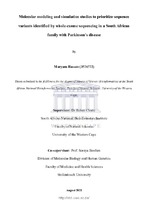| dc.contributor.advisor | Cloete, Ruben | |
| dc.contributor.author | Hassan, Maryam | |
| dc.date.accessioned | 2022-01-19T08:19:21Z | |
| dc.date.issued | 2021 | |
| dc.identifier.uri | http://hdl.handle.net/11394/8610 | |
| dc.description | >Magister Scientiae - MSc | en_US |
| dc.description.abstract | Parkinson’s disease (PD) is a neurodegenerative disorder that occurs due to a loss of dopaminergic neurons in the substantia nigra. It is one of the most common neurodegenerative disorders, ranking second only to Alzheimer’s disease. Research on the genetic causes of PD over the past two decades has led to the discovery of several PD-associated genes. Currently, researchers have identified 23 genes that are linked to rare monogenic forms of PD with Mendelian inheritance. In sub-Saharan Africa (SSA), PD has received little attention due to factors such as underfunded healthcare infrastructure, the absence of epidemiological data, and a scarcity of neurologists. In the relatively few published studies, it has been shown that the known PD mutations play a minor role in disease etiology in SSA populations. In the current study, we follow up on previous work done in an MMed study investigating a South African family with several family members (mother and three sons) suffering from PD. | en_US |
| dc.language.iso | en | en_US |
| dc.publisher | University of Western Cape | en_US |
| dc.subject | Parkinson's disease | en_US |
| dc.subject | South Africa | en_US |
| dc.subject | Memory loss | en_US |
| dc.subject | Brain disorder | en_US |
| dc.subject | Healthcare access | en_US |
| dc.title | Molecular modeling and simulation studies to prioritize sequence variants identified by whole-exome sequencing in a South African family with Parkinson's disease | en_US |
| dc.rights.holder | University of Western Cape | en_US |
| dc.description.embargo | 2023 | |

